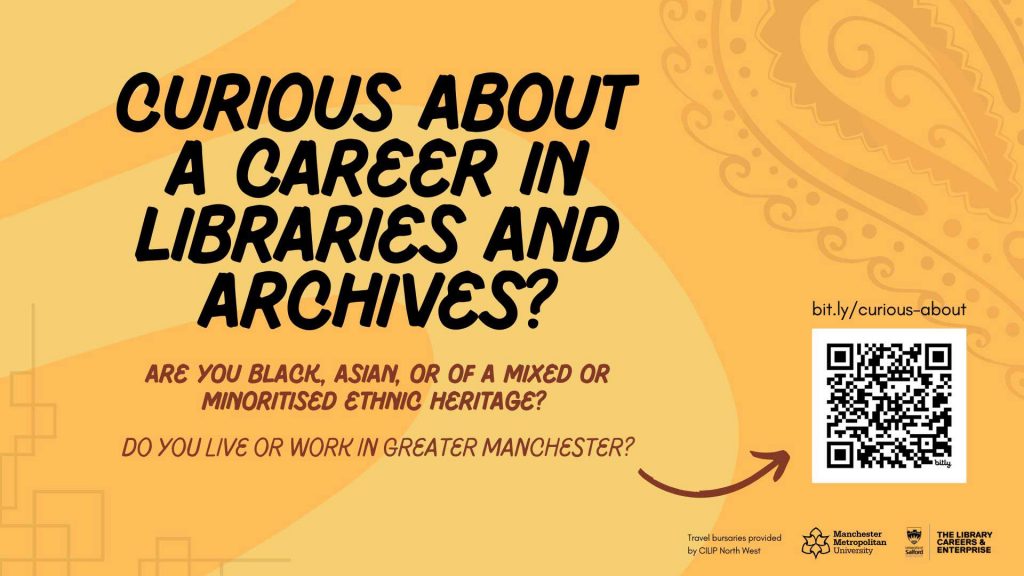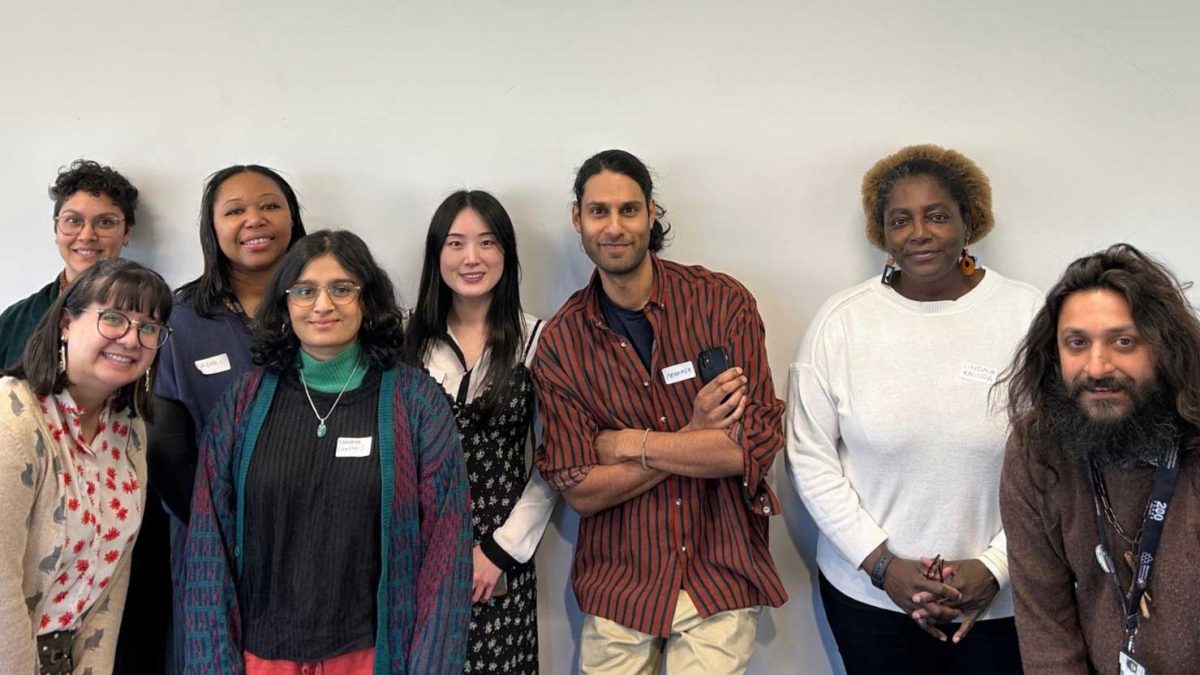Earlier this year an inspirational team of library and archives professionals held an event for people from Black, Asian, mixed and minoritised ethnic backgrounds at the University of Salford. ‘Curious about a career in libraries and archives?’ sought to offer career insights to an audience that is under-represented in the information world.
This blog post shares the experiences of Tanya Williamson, the Academic Support Manager (Research) at the University of Salford, who led on this project. Tanya has a wealth of experience in research support and library services, holding roles including Research Support Adviser at the University of Leeds, Knowledge & Evidence Specialist at the UK Health Security Agency/Public Health England, Independent Information Specialist, Faculty Librarian and Academic Liaison (research) Librarian at Lancaster University, and Senior Assistant Librarian at the University of Huddersfield.
How did you get into your current career path?
I guess it really started way back when I was a student of Graphic Design at University of Brighton in the early 2000s. I started an evening job as a Student Book Shelver in St. Peter’s House Library, which was mainly used by art and design students. I found myself in a happy place immersed in three floors of fascinating knowledge and visual material, looking at the books as I put them away.
The moment I decided to try to pursue librarianship as a career was after I graduated. I was working part-time as a Junior Designer and part-time as a Book Shelver at Lancaster University. I was becoming more engaged and curious about library work and how knowledge is organised and used. I asked one of the library managers how to become a librarian, and she pointed me towards CILIP to try to find a Graduate traineeship as a good first step.
How did the name of your event come about?
I think curiosity is such a vital part of working in libraries and archives, and all of the diverse, related professions you also find in these knowledge-rich spaces. It seems to be part of what leads people into this kind of work or these environments.
The name of the event was also phrased as a question aimed at the potential target audience – if someone saw a poster or online advert for the event and thought ‘Yes’ or ‘Maybe’ then they might investigate further.

What was your aim for the event?
I wanted to create a friendly, welcoming space where people – specifically people from Black, Asian, mixed and minoritised ethnic backgrounds – who are curious about a career in libraries and/or archives could come and learn a bit more about it from people already working in those areas. We focused on people in Greater Manchester and opened it up to everyone: students, current University staff, and members of the public.
The ultimate ambition is to encourage and support people from this broad and diverse demographic group to bring their talent into the information workforce, so we are better represented and able to more fully serve our communities. The Information workforce is 92% white and suffers from a lack of diversity in terms of race and ethnicity when compared to the general population. As well as expecting employers and professional bodies to do something about that, I have come around to thinking that direct, grassroots outreach of this kind is needed from those of us already working in the professions.
We have the potential to be influential role models and a network of advisers.
The event built on a similar event held at Lancaster University in 2024. I was invited to join as a panel member, talking about my experiences working in libraries and reflecting on how that had been for me as a person with a mixed ethnic heritage. The Lancaster event was great, and Fabiha Askari and the team involved in putting the day together worked hard on developing a varied format of talks, careers advice and panel discussions.
That’s where I met Gopal Dutta from MMU. From there we committed to doing something similar in Greater Manchester where we knew we would be able to draw on a network of diverse speakers and a bigger pool of interested attendees.
What happened during the day?
The half-day event took place in the Clifford Whitworth Library at the University of Salford. The format was informal with refreshments and time to chat.
On the day, Jen Bayjoo, Head of Open Research at Manchester Metropolitan University (MMU) delivered her characteristically rousing and entertaining keynote in which she introduced our ultimate ambitions. She also shared some candid insights into her own career journey.
Jen was followed by four career stories from Naomi Davey, Marketing Officer at MMU, Shivaya Prasad, Development Officer at North West Film Archive, Philippa Higman, Library Learning Adviser at MMU; and Linda Kalinda, Knowledge & Library Service Manager at Blackpool Teaching Hospital Foundation Trust. Mona Pasha, Children’s Librarian at Manchester Central Library was sadly missed on the day.
The attendees also benefited from job-seeking advice from Careers Consultant Denise Walker, University of Salford.
To round off the event, Gopal Dutta, Website and Digital Content Officer, and Prakash Chauhan, Library Systems and Discovery Adviser at MMU used their experience in User Experience (UX) research techniques to lead attendees through a cognitive mapping exercise focused on exploring their ideal future career in libraries or archives.
What were your top three moments?
- Watching the event co-ordinators, speakers and attendees arrive and start to chat with each other straightaway. Right from the start, there seemed to be this relaxed and positive energy that did wonders for my nerves!
- Listening to the career stories and the questions that came in response. The passion for work really came across and the attendees showed their curiosity about the practical steps they could take into the worlds of libraries and archives and ways through the barriers they might face.
- Drawing! I really enjoy UX activities and loved the buzz in the room during the cognitive mapping exercise.
What did you learn from the event?
I noticed some common themes which seemed to hold true for people working in libraries and archives in all sorts of different roles. I hadn’t realised before the event that these are quite distinctive!
- We’re motivated by having value and doing good with what we’ve got.
- What matters to us is working with information, materials/artefacts, subject matter, people/communities and in locations that are important to us.
- We think it’s important to have the opportunity to learn and discover
- Transferable skills are valued, so if you have customer service, data analysis, communication, computer science, financial or people skills, make the most of these on applications.
- It’s rewarding to find ways to connect people with the information/materials they need
- It can be confusing and hard to navigate working in libraries and archives at first because there is lots of jargon and even more acronyms.
- When your service is a small part of a bigger organisation, such as a university, hospital or local authority you have to work hard to understand what’s important to all of your stakeholders, not just users.
- Many (most?) people working in libraries and archives didn’t set out to do so at first.
- Commercial advantage and financial reward are not usually the primary motivator of the library/archive worker.
- The people we work with make it worth staying when times are challenging
- We place value on sharing.
In terms of what I learned about encouraging people into the information professions, it came across from the attendees on the day that we need to talk more about earning potential and salary expectations. We need to collectively do a better job of sharing job / volunteering / short-term opportunities across sectors and with prospective applicants. And finally, the routes into libraries and archives, specifically for roles which usually demand qualifications or significant relevant experience need to be much clearer.
What advice would you give to anyone wanting to hold a similar event?
- Assemble a group to collaborate from the beginning but be prepared to lead. There is no way that I could have organised and hosted the event alone.
- Start planning early. It took a while to make decisions, find speakers, agree financial support, and then start advertising to potential attendees.
- Feed people. Food and conversation go together naturally in most cultures.
Put accessibility at the heart of your planning. It’s the right thing to do and makes the event better for everyone.

